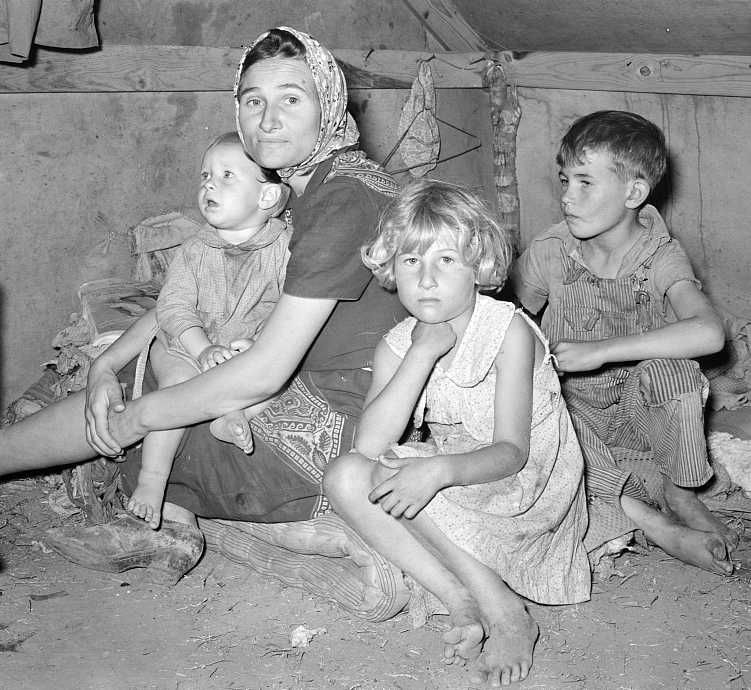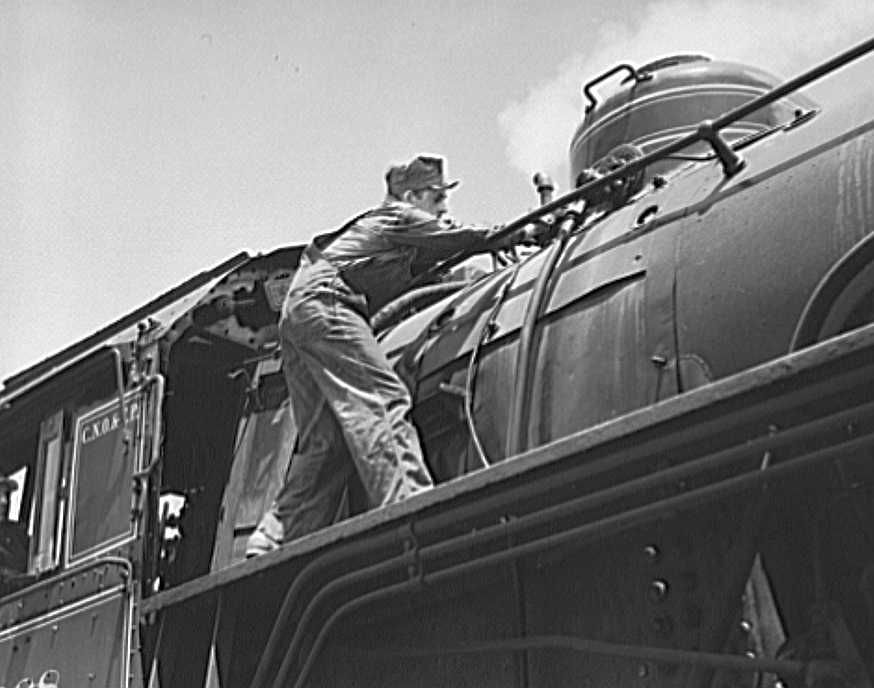
Arthur Payne
I was with a group of men, women and children in and on a freight train headed west through Kansas.
Gossip had it that under such circumstances you should not leave a train in Fort Riley, Kansas. That it was miserably hot, no shade and the railroad detectives were less than cordial.
A group of us young men decided that we would not and could not leave the train at Ft. Riley. We went forward to a gondola car loaded with ballast, (rock that is used to stabilize the road bed) and filled our pockets with rock. We then spread over the top of the freight cars with our hands in our pockets.
We had no plan, no leader, and no intention of violence, hoping to God that nothing would happen. We had simply decided that we could not get off the train at Ft. Riley.
The train stopped and detectives came down on either side demanding that everyone get off the train. No one moved or made a noise. After considerable time, the confrontation was ended as the train whistle blew and we moved on to the West.
I have often wondered what would have occurred had the detectives tried to remove us forcibly. At the time people in our position did not feel we had the right of protest of any kind.
I recall that many times while pulling out of a river bottom or climbing a steep grade, the train would stop and the engineer would come back over the train and pick out two strong young men to go forward to the coal car and were given shovels to help the firemen stoke the steam engine by shoveling coal from the back of the coal car closer to the fire box door.
Since I was young and very strong at the time I was generally given this task. We were given thanks but nothing else. The engine under heavy strain in climbing the grade would erupt smoke and ashes like a volcano over everything behind, including we who were helping the fireman.
FLORIDA
B. Hacket
At 13 rode rails with stepfather to load coal in Kalamazoo in the summer of 1929
(At 8 was a newsboy in Flint, MI.)
“We helped with hog butchering and were given the liver and head.”
Howard, that’s my stepfather, came in one night wide eyed with excitement.
“I’ve got a job” he announced.
“Where? Where?” in chorus.
With Webb Coal Company in Kalamazoo.
"Doing what?”
Unloading coal cars,” he said. “And I’m taking Bill with me.”
Mama put all the clothes she could find on me; layer on layer of shirts and an old wool sweater. I remember that sweater well. It was light brown and moth eaten.
It was the wee, misty hours after midnight, Howard and I made our way to the switch yard to find a train that would take us to that wonderful promise of employment.
What an unbelievable adventure. I felt like Tom Sawyer, Huckleberry Finn and Swiss Family Robinson combined. Slipping around furtively to avoid being spotted by the gumshoe. That’s what we called the R.R. detective. He was also known as the railway dick and shamus.
Howard selected a train going in the right direction and found an empty boxcar. He hoisted me in and clambered in himself. We huddled together in a corner of the car in order to avoid the gumshoe. The inside of the car smelled of pine and creosote.
The switch engine shunted us this way and that. There would be a bump and then our car would roll a ways and we’d hit another car with clang and bump. I could see the signal lanterns, red and green, from my corner of the boxcar. But not the men that wielded them.
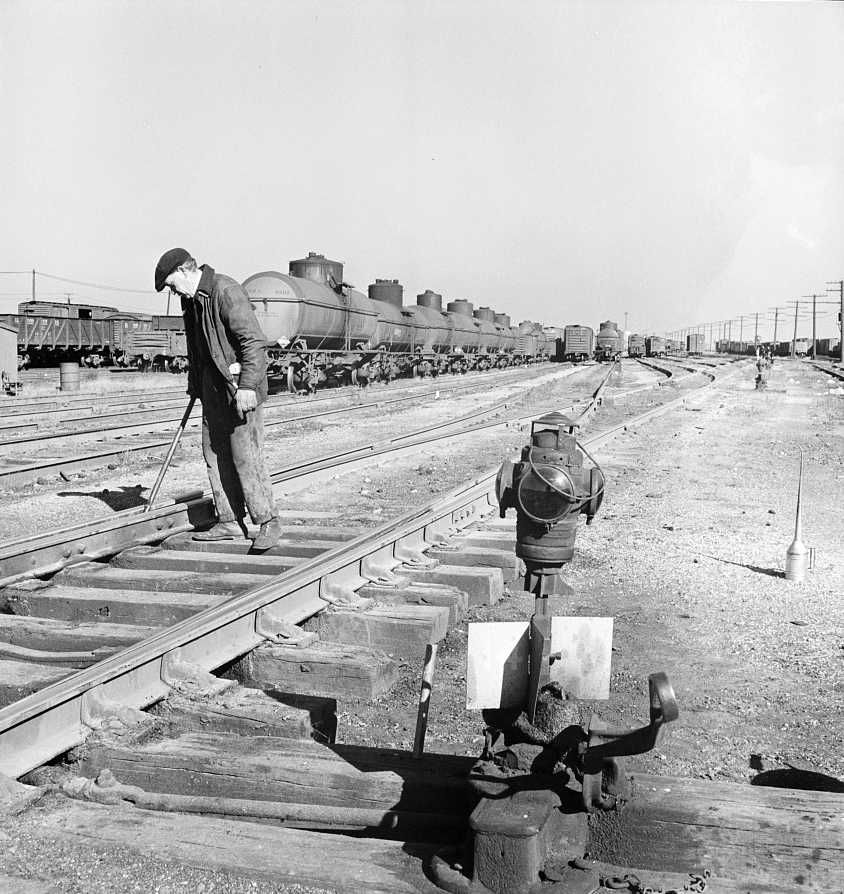
This was the most thrilling, the most exciting adventure of my life. There was the thought of being caught by the railroad detective and thrown off the train or even put in jail for trespassing. The heart beat fast and the adrenalin flowed. Finally the train was ready and with two toots of the whistle and a great spurt of steam our locomotive got under way.
Our boxcar creaked and groaned, shivered and shook and rattled and complained and the wooded floor bounced our bodies a million times a second. Most of the night was spent standing in the corner of the cars with out knees acting as shock absorbers.
I will spare you the particulars of how we arrived in Kalamazoo, broke and hungry. We spent our first night in Town sleeping under a hedge of bushes. Rising at the first hint of gray dawn to wash our faces in the dew of the grass, wiping ourselves with our shirt tails.
We got the job at 25 cents an hour, 10 hours a day. One dollar and fifty cents a week. The coal cars or gondolas held 50 to 55 tons of huge lumps of coal.
Howard and I put I in the summer and with pockets full of cash caught a fast freight back to Flint.
At age 14, I left school after a run in with the superintendent. Hopped a freight and began to beat my way round the country as a railroad bum…
***mulligan stew: dandelion, pigweed, sour dock, wild leeks and onions and a handful of navy beans probably carried around for months in a pocket along with Bull Durham, cigarette tobacco and lint.
FLORIDA
Bill Hecht
from Springfield, Ohio
Guy grabbed on to cowcatcher in the dead of winter and was found frozen to it, stone cold dead, 15 miles down the line.
Bo leaped off a fast-moving freight, hit the cinders so hard he came right out of his shoes. Soles torn off and all.
Guy dressed to the nines in top hat and tails waving to us from the box car as his fast freight to New York City rolled by.
Two kids hopping freight trains climbed down into a refrigerator car and never got out alive. The hatch slammed shut and they were both found later frozen to death.
“thieving, conniving, traveling caddies"
FLORIDA
Charlie Smith
Lost finger in boxcar door
Woman in New Orleans gave him a raucous green, wildly-checkered suit
Detention camp in New Orleans.
Coming down with malaria in New Orleans, I recuperated with relatives of Bob in Dyersburg, Tenn. And then we hitched our way to Watertown, South Dakota.
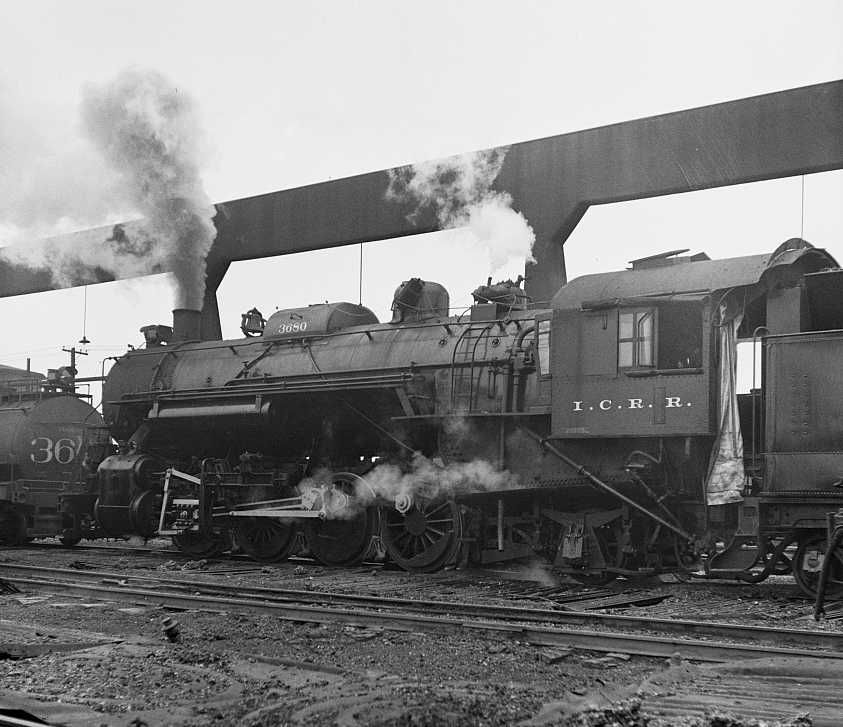
FLORIDA
Cliff Fitzgerald
Rode with Rev Kenneth Warren, D.D.(MA)
Two teenage boys looking for adventure in the Depression days of the thirties.
Boyhood chums in Oklahoma City. I was 17 and Ken was 16 and there was much publicity about the Carlsbad Caverns in NM being open to the public. I scraped together $5 from mowing lawns, selling magazines and so on. Ken came up with $5. He had presence of mind to set back another five dollar bill which he did not mention early in our trip.
Riding from Hobbs, TX to Waco….
The hi-ball freight train to Waco roared on into the rainy night oblivious of the dramas happening aboard it's reefer box cars.
Just as I collapsed in sudden fatigue induced sleep, Ken reached out and grabbed me!
He kept a firm grip on my arm with one hand as he struggled to hold the railings with the other.
Lucky for both of us he was successful. Otherwise we would have rolled off the top of that speeding freight train together to our certain deaths.
That narrow escape kept me awake for the rest of our harrowing trip.
There was another boy who had been riding in front of Ken and I on this same box car. I have always wondered whether that night was his last night to live or what really had happened to him.
I recall that he was a pudgy young kid. Looked to be about thirteen or fourteen years old. Wearing glasses he kept trying to clean and dry with a wet dirty rag.
Because he was sitting in front of Ken and I, when the rain started, he was hit full force with the fury of the hard sudden storm. He yelled to us that he was going to get between the box cars and ride on the ladder to get out of the rain.
Of course the wet steel ladder rungs were greasy and slippery. He climbed down between the box car we were on and the one just ahead.
As he disappeared down the ladder, the train hit an outside curve that set the big loaded box cars to leaning as well as swaying, as the powerful drivers propelled us on through the night.
We never saw that boy again.
With the fear of the dangers from falling asleep again or the danger in any careless move, I was able to stay awake for the rest of the night. We pulled into Waco at dawn.
As the big locomotive pulled into the huge rail yards, the steam engine seemed to breathe a sigh of relief.
FLORIDA
David Roggenkemper
I graduated from high school in 1930, age 17
The day after Christmas 1931, I left home – destination Arizona - to work as a caddy
Most of the highway travel is by day, while most of rail travel by night.
Put money in shoe for safety and a third of it wore out!
FLORIDA
Dominick Grella
16 in 1934
left Brooklyn, NY
“The future looked bleak but you couldn’t tell that to a 16 year old. It was a time to go rambling, to wake up in a different town every day.”
“Hit the road” : popular expression in the 1930s
Abraham (Al) Zion from Philly, best friend and pal I traveled with.
Moonshine and cigarettes for 90 cents a carton
30 days chain gang in North Carolina
How did you learn the ropes?
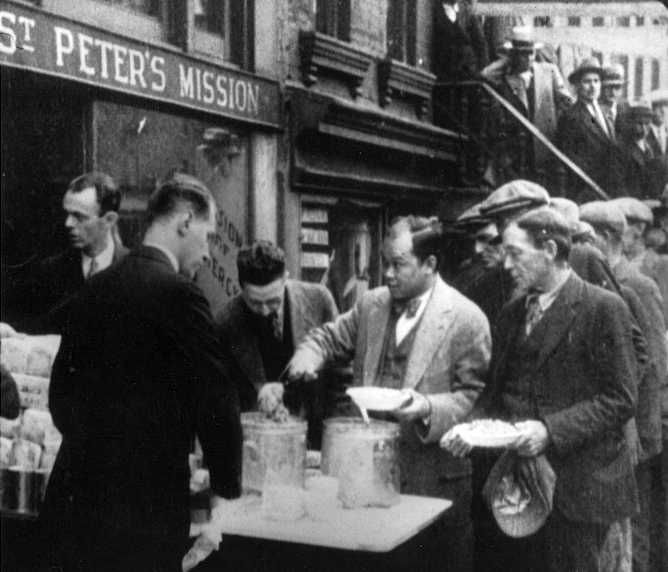
“I could not believe the way some of the black people were treated in Alabama...
"Got to thinking that I read somewhere inalienable rights… freedom and justice for all.' Someone who wrote that was full of crock."
“An experience so valuable in late life. How to ride the rough ruts. How to take it easy. It was sweet at times. Never know how wonderful Mother Nature could be, looking at all its glory in so many parts of the USA
“That evening we hooked onto the Seaboard Air Line going to North Carolina. It’s early morning, the train is stopped, we get hunger pains, no food almost 48 hours.
"As we cross the tracks to get to town to eat, railroad detective hails me saying, where y’all going. He had a black kid in tow who was my age came off the same train.
He tells me he saw me getting off the freight car; anyhow we go before the justice of the peace. This is Rockingham, North Carolina. Richmond County. He fines us 6 or 8 dollars, I forget. I told him I was broke and headed back home to Brooklyn NY. He says do I wire your folks back home for the money. Hell no, I say. Okay, then, 30 days on the chain gang.
"I do believe the date was June 6 1934. Off we go saying, heck at least they got to feed me. You walked into a nice size building, on one side, a big room with bunk beds. On the right side all the black men were jailed.
"First off they shaved your head clean. Tetanus shot every Sunday. They chained your legs only if you got into fights or were incorrigible. There were no long terms, 90 days were the maximum if the charge was more serious.
"The chain period varied, 24 hours, 96 hours according to the infraction. 5.30 a.m. they roused you; washed up as best you could. Breakfast at a long table with aluminium plates. Corn bread was served every meal. Mush, Corn Bread, Coffee was breakfast.
"Then off to work some worked in a quarry other digging ditches along the N.C. State roads. Can’t figure out how these ditches served any purpose, just to keep the men busy.
"The guards all called me "Brooklyn." Naturally there was always a guard with a shotgun to oversee you. You worked ten hours a day from 7 a.m. to 6 p.m. with hour for lunch They brought the rations to you for your lunch. Nothing fitted us; my pants was rolled up cuffwise; hat didn’t fit; shirt too long.
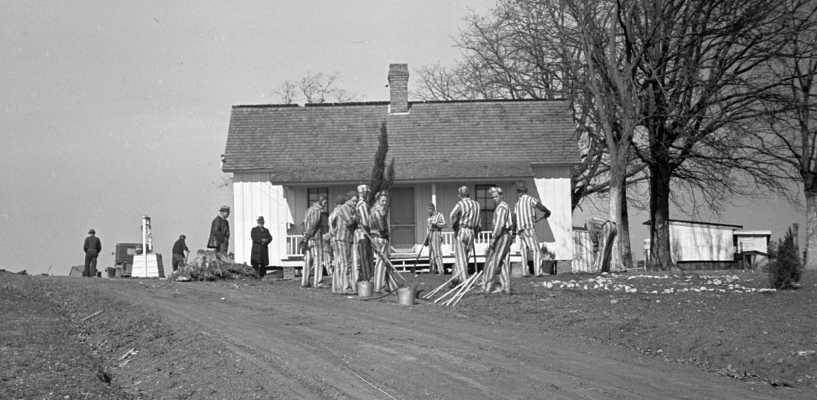
We knew right off this ten hours a day was for the birds. The second day a car pulls up with a North Carolina VIP tag of some sort, so we dropped our shovel and was ambling over to talk to the man.
"The guard hollered where do you think you going Brooklyn?
" The man in the car said come on over kid. We started to give him a crying spiel that we could not take the work anymore; he asked me my age told him I was 16; then asked me what was the charge that you are held here for; told him riding a freight train.
"He called the guard over, he says the guard, you carry the sign 'Men Working' a hundred yards up the road when we get there you keep moving the sign up.
" Walking up the road we had first crack at all the clinchers (we called them cigarettes thrown away and cigars.) The cigars we rolled in a newspaper and when we got back to camp or the jail compound we would throw the cigars wrapped in paper through the cell bars for my black friend. - Would you believe he smoked cigars we smoked roll your own
"That night the director of the camp calls me calls me out of the cell block and says Brooklyn you are a trustee as of now. We slept on a cot between the Prisoners mess hall and where the guards ate. My job was to put out all the aluminum plates for the inmates; after breakfast we gathered the plates and dumped them in the sink we did not wash them. The black cook Clarence and his helper did.
"Then we sat down for our breakfast, whatever the Guards ate, we had bacon and eggs, potatoes, hey that was some uplift. After eating a guard and I would gather any and all food leftover and go give it to the pigs in a pen inside the prison compound. !
"Then the rations were prepared for the men working in the quarry or on the road, after they ate back we would go to the camp or chain gang as some called it. The whole afternoon would be ours.
"Clarence the Cook would say to me go pick as a mess of Blueberries and he would bake blueberry pies.
"Clarence was a real down to earth human being. I remember he used to get a tremendous kick when we cursed Brooklyn style. Better leave a lot of that out...
"That June month of 1934. Primo Carnera was the heavyweight champ; he was to fight Max Baer. The director of the camp, the doctor and their wives asked me if I cared to listen to the fight on the radio, of course we did. Baer knocked Carnera out in the 11th round.
"After 24 days they told me I was free to go. Would you believe the director and the doctor wanted to adopt me? How could I? We had two wonderful people, my mom and dad.
"I do have to add that those North Carolina tar heels were some of the swellest people I met in my roaming around the country in 1934.
"We leave with 25 cents on us and buy a baseball cap to cover our dirty looking hair. Naturally we grab a freight train S A L. Don’t you think we get kicked off in Henderson, NC!
"We cried and told the railroad dick we were headed home, just got out of the chain gang. He pointed at the highway and said stick to that expletive road till y’all get to New York.
"We did get to Richmond by hitchhiking, then waited half a day for an RF and P Freight train to Washington, DC.”
FLORIDA
E. R. Schamhaltzer
Alabama kid, son of railroad men. Born 1924 in Brewton, Alabama
Father was an engineer on the L.N. Railroad and made good money. He bought food for our family and many relatives. Later he was laid off by the railroad and worked for the WPA for $1.00 a day.
“I was 12. I began to realize that something is wrong here. You would have several families from Houston, TX, leaving because they had heard of openings in Detroit. The next night would see people from Detroit who had heard of job in California!”
Went on road and spent seven summers traveling as “runaway from good home for adventure"
Saw one rider killed and one lose his legs
Meal of ketchup and crackers. Singing to kill hunger pains.
“No person bothered me. Each person had his own problems and survival was a priority.”
“This was the only time in my life that I was really free.”
FLORIDA
Edith Ely Walker
Young married couple
“Bob had $4.95 and I had a pair of shoes I had bought for $1.95 and had not worn. We decided to take them back.”
I wore suit made out of fertilizer bags. It looked like linen.
“Here I saw my first palm tree, which was quite a thrill.”
Made and sold “Depression Flowers.”
These are the directions for Depression Flowers.
Tools needed:
can round - pencil
tin snips [- fine wire
ice pick - hammer
Remove top of can below seam.
Leave bottom of can on.
Cut can all the way down to base along one side of seam. Cut tin in 3/16" strip all the way back to seam. These make the stems or branches.
Make as many holes as needed in each strip with ice pick. Wrap each strip around pencil.scissors - colored crepe paper
Make flowers and leaves with crepe paper and attach with wire through holes in stems.
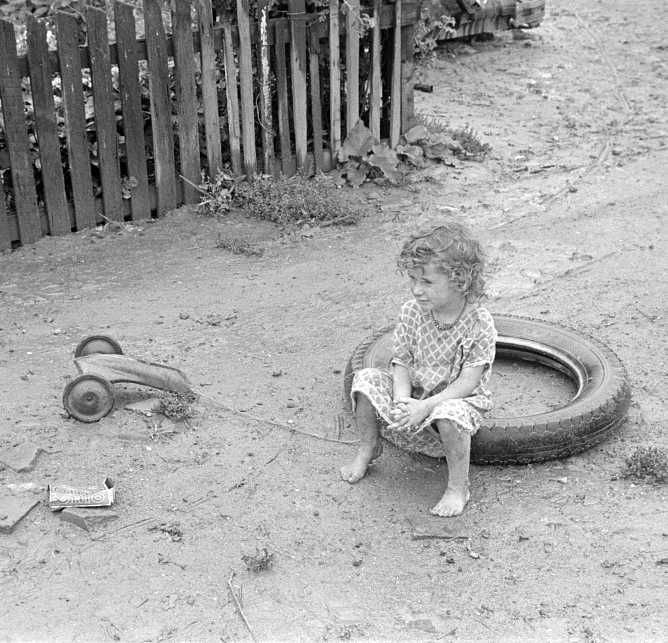
FLORIDA
Elmer Wieland
Slept in jail with my loaded .38 under my bed after being jailed for 30 days in Salt Lake City. Put on Kitchen Duty and given belongings to keep in cell by jailer.
Salt Lake City sheriff owned ranch and had contract to feed prisoners. It behoved him to keep all the beds full and when a group would be released the deputies would go out to round up just enough to fill up the place again.
FLORIDA
Erling Kildahl
1936
Off to Jamestown College at 16
Rode with brother, Harold, eight years older
I know Mother and Dad felt diminished and shamed by our travel arrangements. They simply did not have enough money to send us off in style, but they were flexible and adapted to the tough economic times.
They trusted that I, their youngest child, would be safe, protected by Huck on this adventure. They knew he was thoroughly experienced in riding the freights. He and Phillip (another brother, in age between Harold and me) had always returned safely from their trips west from Minneapolis.
Nevertheless, it was with chagrin, worry, perhaps despair, that they had driven us in the Model A from Coeur d'Alene to St. Maries. If so, they showed little of their inner turmoil as they said their last good-byes and started home. I wonder now at their toughness and stoicism.
FLORIDA
Eugene Bratton
14, left home after mother’s funeral
99% of those unfortunate men and a few women were trapped and destroyed by the economics of that period. They were only trying to get somewhere, anywhere, they could find work and support their families left behind. They were basically good hard-working people and treated railroad property with respect and gratitude.
The 1% or less of real bums wouldn’t have taken any kind of job and their horror of work was a black eye on the other 99%.
They would foul the cars and their crude ways were a class apart from the many who tried to protect railroad property as best they could. For example; most of the people including ourselves carried pieces of paper or a paper bag in case a call of nature could not be ignored. This could be disposed of outside the car. The real bums would not care... A disgusting affair, but bothered them not at all. This was another black eye against the riders by the men who cleaned the cars and they hated riders even more than the trainmen.
My brother and I considered ourselves as railroad people; many of the others did too. Several times, at considerable risk, we would tell a brakeman or conductor that waste was being removed from the axle bearings. This oil soaked waste would feed oil into the solid type bearings, used at that time and removal could cause the wheel bearing to run dry and could result in a frozen wheel and derail the entire train.
This information was greatly appreciated and once we were rewarded by a whole division ride in the caboose, even letting us ride in the cupola, a small box on top of the caboose, with a view over the entire train. A wonderful experience for us and greatly appreciated.
Sometimes those jug heads would take this oily waste into a car and start a fire on the floor of the car. These old cars were all wood and once the fire got a good start would be extremely hard to put out. My brother questioned one of the bums about this hazard. His reply was a dandy, ”Oh, well, if its gets out of control we will just piss on it.”
This country was made by pioneers. My great-great grandfather was one of these. Perhaps these people seeking a way to make a living, were pioneers in a way, of the Great Depression.
FLORIDA
H. C. Rand
16
1934
“I took my Boy Scout canteen attached to my belt and a cheap red and brown Indian blanket with a single change of clothes rolled inside. The blanket tied with a rope and slung over my shoulder. This was my “bindle” from which hoboes of the day derived name “bindlestiffs.”
My travel funds of seven or eight dollars were secured in a money belt around my waist.”
North from Kansas City
“Perhaps I should say something about the culture of those times so you can understand how a 16-year-old kid could embark on a journey of this sort. In 1934 there were no jobs to be had, no welfare, no social security – just soup kitchens and handouts. The crowds of people on the freight train were good, honest blue-collar types looking for something – anything – to tide them over the hard times.
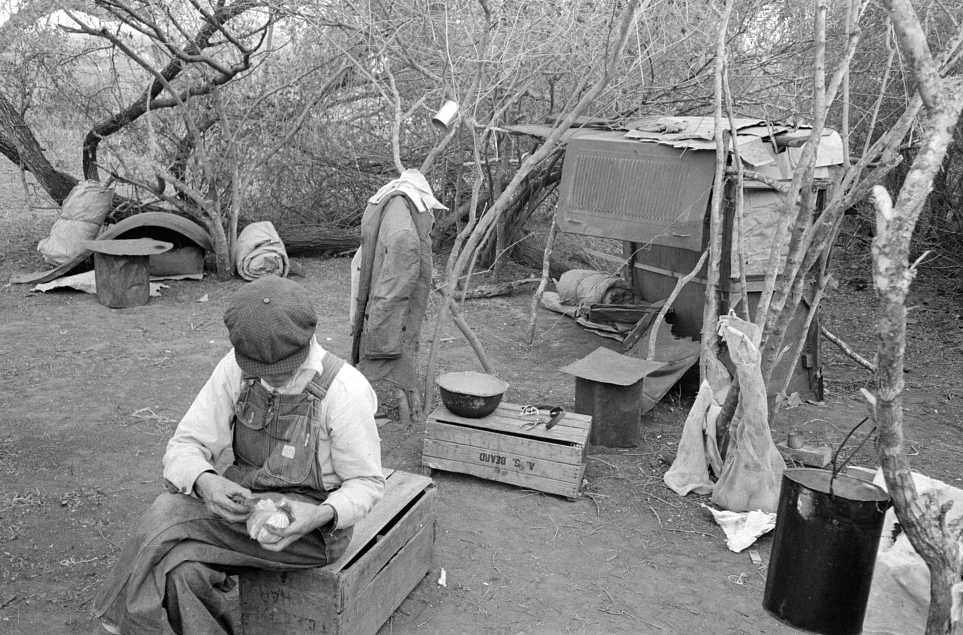
“An even less comfortable night was the freezing night in Montana when I dropped into the empty ice cage of a reefer. A refrigerator car is similar to a boxcar, except there are two wire cages at each end to hold ice. When the car is empty workers will frequently leave the main cargo doors closed, but open the little ice-filling doors on the top of the car. A hobo could drop down into the ice cage and be relatively sheltered from the wind and cold.
I dropped into an ice cage that was already filled with people. The best I could do was sit crosswise in the cage which was about thirty-six inches wide. I was so tired that I fell sound asleep with my knees drawn up to my chest and my head on my knees.
“The next morning I tried to stand up, but I could not get out of the balled position in which I had spent the night. The wire in the cage was similar to chain link fence and it had embedded itself an inch deep in my back. Others in the cage had to rub and pummel me until I got enough circulation to straighten up.
A similar freezing night in Montana I was in a gondola car with half-a-dozen farmhand types and a big fat farm lady in overalls. We survived the night by piling up in one corner of the car with the fat lady as a heat source at the center of our pile. I can assure that our only interest in the lady was radiant warmth.”
FLORIDA
Harold Kolima
1937
Mom traveling with three kids 5 + 7 + 9
We left Omaha, Nebraska because social workers were trying to take myself and two brothers away from my mother who raised us by herself. We went to California and got caught in a "Grapes of Wrath" type existence. We wintered mostly in Sacramento. We took boxcars to and from Nebraska and followed crop harvests by rail.
Mom learned the ropes from hobos who frankly used us (a mom with three little boys) to acquire food that they shared with us.
We could acquire food by:
going to dairies for free buttermilk
bumming beans and sardines from grocery stores
going to Salvation Army food kitchens
going to churches for food and shelter
going to police departments and/or jails for shelter usually we got food
As we plodded through freight yards, the brakeman and engineers would throw money to us voluntarily.
We were bedded down in a boxcar headed west, when several hobos enter the boxcar.
Our puppy dog barked and growled at them. One of them came toward us. He struck a match and exclaimed, “Hey we got a whole family in here except for a daddy. Hell, I think I will be daddy tonight.”
Whereupon Mom fired her little 25 caliber automatic through the bottom of the boxcar. Our hobo Romeo retreated to the far end of the box car. We had no further problem that night.
The most remarkable thing was when the sheriff in Yuma AZ paid our bus fare on into CA when we expected to go to jail, because mom kicked the door window out of a grocery store to get us some groceries.
Remembered a bank robber who taught me to count by counting match sticks.
I witnessed many fights. Some over food, some over wine or other booze and some over my mother or to impress my mother. I remember once when we were freeloading from the snacks at the end of a bar in a railroad beer joint. A man stumbled in from a fight in the alley. He was holding his guts in with his hands until he passed out. He had been knifed.
